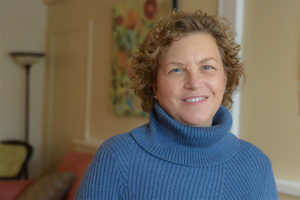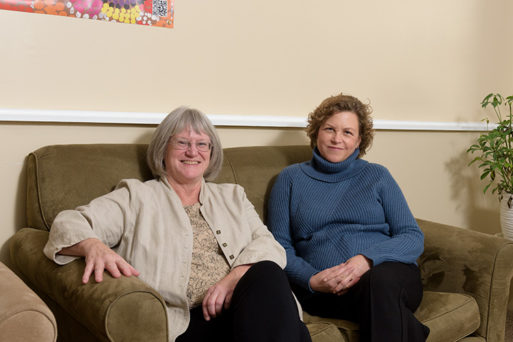Today Sevenponds speaks with Merilynne Rush, founder of Lifespan Doula Association, an organization in Ann Arbor, Michigan, that provides professional End-of-Life Doula training and certification, continuing education programs, mentoring for doulas, and resources and referrals for individuals and families seeking end-of-life support. Merilynne Rush and her Lifespan Doula Association co-founder Patty Brennan are experts in the doula model of care and adult education specialists with decades of teaching experience.
Editor’s Note: This interview has been edited for length and readability.

Credit: lifespanmedia.com
Ellary Allis: Can you give us a little background on yourself and what led you to found Lifespan Doula Association?
Merilynne Rush: I was a home birth midwife for many years, and I worked with families who were choosing to have a natural birth integrated into their family life. A few years after retiring from that career, I found out that there was an option out there for people to have a home funeral. The more I learned about it, the more I thought that that was what I would want for myself.
I was trying to figure out if that was what I was going to do and talking to friends about it. As my friends learned about it, they started saying, “We want you to do this so that you’re available to help us.” I decided to launch a business called After Death Home Care and be a home funeral guide. I’ve assisted probably 45 families in Michigan in the last nine years.
That lead to an interest in green burial. I started consulting with cemeteries who wanted to start doing green burials; I did a green burial conference, and I served on the board of directors of the National Home Funeral Alliance. In the process, I started doing advance care planning and facilitating conversations between individuals and their chosen healthcare advocate about their values and goals for end-of-life medical care. I also started hosting a Death Cafe in the fall of 2012, and I’ve been hosting it every month since then. I think that makes us the longest-standing regularly meeting Death Cafe in the world.
At that point, I was talking to a friend of mine who’s also a former home-birth midwife and a really experienced birth and postpartum doula educator. We started talking about offering end-of-life doula care. We settled on the name “end-of-life doula,” rather than “death doula” or “death midwife” because it was the most broad and really described the scope of what end-of-life doulas do. Some people focus on the active dying phase, or vigiling, or legacy work, or home funerals. We’re focusing on all of it, from initial diagnosis through the bereavement period. The term end-of-life doula encompasses the whole era. I helped form the National End-Of-Life Doula Alliance then. And that’s been the evolution over the last ten years.

Credit: lifespandoulas.com
Ellary: Can you give a brief description of what an end-of-life doula is?
Merilynne: An end-of-life doula is someone who provides whole person, whole family, comprehensive support in physical, emotional and spiritual realms to dying individuals and their families, from initial diagnosis through the bereavement period, while following the doula model of care.
Ellary: What is the doula model of care?
Merilynne: The doula model of care is a holistic, family centered approach that is non-clinical and non-medical. It fosters informed decision making and self-determination in the realms of physical, emotional and spiritual support. It emphasizes support rather than doing, and it is non judgmental and empowering rather than bringing a particular set of structures into the process. It also includes providing information, resources, and referrals, and hands on comfort measures, and helping the family make meaning from their own experience rather than bringing a prescribed meaning into it. It’s non-medical and non-judgmental, and it’s leaving your shoes at the door. It is also well informed and well trained work; the end-of-life doula provides a lot of resources and knowledge and skills.
Ellary: How does an end-of-life doula work in tandem with a hospice nurse, and what does and end-of-life doula provide that hospice doesn’t?

Patty Brennan (left) and Merilynne Rush
Credit: secondlifemedia.com
Merilynne: The doula collaborates well with the health care team, whether it’s pre-hospice, regular medical care, curative care, palliative care, or hospice care (hospice is a form of palliative care). The role of the doula is to make the most of those care providers, and to help the family make the most of all their resources so that they can spend more time with their loved one. It helps fill in the gaps left by hospice care.
The gaps that occur in hospice care are mostly based on the fact that hospice workers don’t have as much time to spend with each family as they would like. Some doulas work through hospice agencies, but some hospices don’t hire doulas. In the latter case, the doula would be contacted directly by the family and would be able to figure out with the family what they need and how to navigate all of that. Some doulas will be on call; some doulas will do overnight care, and some doulas will do respite care doing bedside vigils. Hospice workers have to go from patient to patient and don’t have as much time.
This concludes part one of our interview with Merilynne Rush. Please come back next week to learn more about death doulas and doula education.

 What Is the Role of an End-of-Life Doula?
What Is the Role of an End-of-Life Doula?


 First the Wealth Gap, Now the U.S. Has a Growing Health Gap
First the Wealth Gap, Now the U.S. Has a Growing Health Gap

 Our Annual Seven Holiday Gifts for Someone Who Is Grieving, 2024 Edition
Our Annual Seven Holiday Gifts for Someone Who Is Grieving, 2024 Edition














